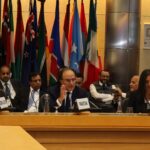UNITED NATIONS, June 24 (APP): United Nations Deputy Secretary-General Jan Eliasson has urged member states, particularly those with membership in the Security Council, to make full use of the Peacebuilding Commission and its role in preventing violent conflict.
He was speaking on behalf of Secretary-General Ban Ki-moon at an event marking the tenth anniversary of the first meeting of the 31-member Commission, which has become known as “Peacekeeping Day”.
Eliasson recalled resolutions recently adopted by the General Assembly and the Security Council which stress that sustaining peace spans the entire conflict cycle, with a focus on prevention, as well as on addressing continuation, escalation and recurrence of conflict.
The resolutions also emphasize the Peacebuilding Commission’s advice during transition periods when peacekeeping operations and special political mission mandates are being defined or reviewed.
“This comprehensive approach spreads responsibility for prevention over the entire UN system,” he said, welcoming the encouragement of the Commission to give advice on addressing the drivers of violent conflict.
“This should be done in an effective, coherent and comprehensive manner, bringing together all relevant actors across the UN system,” he added.
Noting the fragility of transitions and the risks of relapse to conflict, Eliasson also welcomed the Security Council’s intention to regularly request and draw upon the specific, strategic and targeted advice of the Peacebuilding Commission.
He further said that it is during transitions that the UN system jointly identify peacebuilding needs and in many cases reconfigures its presence on the ground, underlining the following challenges:
Risks of fragmentation; Complexities in the financing; and
Political support.
Emphasizing that fragmentation of work in periods of transition is not only costly but also reduces impact, the Deputy Secretary-General underlined the effective role played by the Peacebuilding Fund in enhancing coherence among different actors within the UN system.
To be more effective, as a system, he said ‘silos’ should be broken down through a unified vision and coherent ‘horizontal’ actions.
“The Fund supports initiatives which align with a common peacebuilding vision of the Member States and which the UN can strengthen by bringing together various entities,” he said and added that he believes Member States also need to re-think the scope of peacebuilding and to consider ways in which they, too, can bring a greater level of coherence to efforts to sustain peace.
As a result of the challenges and complexities from financing, in particular those brought on by the different financing streams both within the UN system and for the countries Eliasson noted that critical long-term peacebuilding tasks are often under-resourced.
Explaining this phenomenon in the real world, he said the work moves from activities such as missions mandated by the Security Council, funded by assessed contributions, to those undertaken by the UN country teams which are funded by voluntary contributions, development funding tends to come too late and declines too early, just as or at times even before, the missions are drawing down.
“Some have referred to this as a financial cliff,” he said.
Recalling that the Peacebuilding Fund was created, in part to avoid this cliff by providing quick funding for critical peacebuilding initiatives, he warned that Fund itself is facing a desperate funding shortfall and stressed that this situation should be addressed urgently.
He applauded UN Member States for hosting a pledging conference for the Fund in September, and urged them to attend and contribute generously.
Also recalling the request to the Secretary-General by the sustaining peace resolutions to present options to ensure adequate resourcing of UN peacebuilding, Eliasson sought the support of the Member States through both assessed and voluntary contributions, including during mission transitions and drawdown.
“This would substantially support the stability and continuity of peacebuilding activities,” he said.
He said that a group has been setup within the UN to work on these options, building on what has already been done.
He reported that the Fifth Committee recently approved $14 million in programmatic funding in peacekeeping budgets in five countries to support mandate implementation through UN Country Team peacebuilding, including in important transitions such as that of the UN mission in Haiti (MINUSTAH).
Highlighting the role of the Special Representatives of the Secretary-General as critical to the political processes particularly during a transition, the Deputy Secretary-General expressed that post transition, it often receives significantly less support, even though it remains important.
This situation, he said creates a ‘critical gap’ which has been partly filled by regional political offices and by the Resident Coordinator, supported in some countries by Peace and Development Advisers through a joint DPA-UNDP, and supported by Peacebuilding Support Office.
Closing his remarks, the Deputy Secretary-General said that the peacebuilding architecture was created in 2005 to fill a ‘gaping hole’ in the UN machinery, and the new resolutions provide a roadmap for the system to move in a new direction.
“The people of the world count on the support, on the political will and on the leadership of the entire membership to truly sustain peace. This is a challenge we should all accept and embrace,” he concluded.



